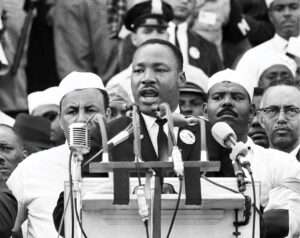By Carol Fisher-Linn
In the United States, only three individuals are celebrated and honored with a national holiday: George Washington, Christopher Columbus and Dr. Martin Luther King, Jr. President Reagan finally signed the bill to create the holiday but to be clear, it was under pressure: Congressman John Conyers first led the push to make MLK’s birthday a holiday in 1979, but Congress voted it down (“too expensive to the nation – MLK is a private citizen.”) It took until 1986, and the largest petition ever at the time in favor of an issue in U.S. history (6 million signatures), to pass the law by Congress (this, from a 2006 article in The Nation) and to be reluctantly signed into law by Reagan. (“I would have preferred a non-holiday in King’s honor but since they seem bent on making it a national holiday, I believe the symbolism of that day is important enough that I will sign that legislation when it reaches my desk.” 10/20/1983.) On August 23, 1994, the King Holiday and Service Act was signed into law by President Bill Clinton. Inspired by King’s life of service, Congressman John Lewis and former Senator Harris Wofford proposed the legislation to encourage Americans to find common causes and methods of improving their communities. This from “The 15-year battle for Martin Luther King, Jr. Day” found at National Museum of African American Museum of History and Culture. This piece reminded readers that, although the bill was introduced 4 days after King’s assassination on April 4, 1968, it took 15 years for approval and another 17 to be recognized by all 50 states. Imagine!

I wasn’t around when, in 1841 Frederick Douglass, (an early social reformer who opened the way for King) and a friend audaciously entered a train car reserved for white passengers in Lynn, Massachusetts. (Imagine being in their shoes). Of course, they were ordered to leave, and they would not, inspiring protesting which finally led Congress to approve The Civil Rights Act of 1875 (34 years later – the wheels of justice grind slowly) granting equal rights to Black citizens in public accommodations. Of course, it only took the Supreme Court 8 short years to overturn this victory, declaring it unconstitutional in 1883. Back to square one and the torch finding its way into the able hands of Dr. Martin Luther King.
Why celebrate this man? A little history… I do remember watching Douglas Edwards on CBS news reporting about the Montgomery bus boycott of 1955 on our little black and white console television. He told us how Rosa Parks was arrested on December 1, 1955, for refusing to give up her seat to a white man on a city bus which led to a city-wide bus boycott. For 381 days Black community members, bravely walked or ride-shared until the U.S. Supreme Court ordered the city to integrate its bus system. This is where destiny collided with Dr. Martin Luther King, Jr., a young pastor who emerged as a prominent leader in the American civil rights movement, spreading his commitment to non-violent resistance. It was then that the Southern Leadership Christian Conference was formed.
I also very clearly remember watching on the nightly news, when King and the SCLC gathered in Birmingham Alabama, in 1958, to peacefully gather to end segregation. Here they experienced push back from firehoses and attack-dogs turned on them by the local police. It was after these horrific broadcast images that American outrage forced the passage of civil rights legislation – The Civil Rights Act of 1964 signed into law by President Johnson. After the protests, again led by King in Selma, and the police brutality, again seen across screens in America, the Voting Rights Act of 1965 was enacted. Of course, then came 2013 and the devastating Supreme Court ruling in Shelby County v. Holder that rendered the Voting Rights Act a shell of its former self. The fight never ends.
Anyone who heard MLK’s famous, “I Have a Dream” speech can hardly forget watching him deliver one of the most iconic speeches in American history to over 250,000 civil rights supporters gathered at the steps of the Lincoln Memorial in Washington, D.C., on August 28, 1963. Like the Gettysburg Address, this too, is a speech every American citizen should know, understand, and hold close to their freedom loving heart. You can find a link to the speech at npr.org.
Here is the link:
https://www.npr.org/2010/01/18/122701268/i-have-a-dream-speech-in-its-entirety
Another King legacy was his Letter from a Birmingham Jail. Anyone keenly interested in civil rights struggles and history might want to take the time to read this lengthy letter. It can be found on the King Institute site on Standford.edu.
Here is th4e link: https://kinginstitute.stanford.edu/sites/mlk/files/letterfrombirmingham_wwcw_0.pdf
Go out and do something good this Martin Luther King Day. As beloved Congressman John L. Lewis would have us do: “Get in good trouble, necessary trouble, and help redeem the soul of America.”
